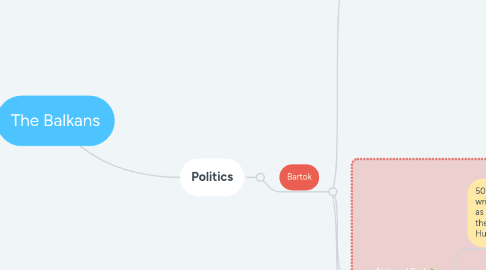
1. Politics
1.1. Bartok
1.1.1. Cultural theft? Political controversy and attacks arguing about the following themes which were very heated especially after WWI
1.1.1.1. Openness to Culture
1.1.1.1.1. Bartók suggests that the integrity with which he himself associated his music represented a higher, more universal ideal than that expressed by national politics
1.1.1.1.2. Bartok collected 'pure' music. Which to him, meant authentic peasant music of any ethnicity. His only objection was popular music like urban folk, or folk from the city that was 'vulgar'.
1.1.1.1.3. Believed that a style that reflected the unique essence of community was when numerous performances combined into a homogenous style.
1.1.1.1.4. First and Second Rhapsody for Violin and Piano (1928) (which then was rearranged into Violin and orchestra in 1929)
1.1.2. National Pride
1.1.2.1. 50th birthday interview with Romanian writer Octavian who referred to Bartok as a 'Romanian composer' because of the border changes of his once Hungarian birthplace.
1.1.2.1.1. Bartok was offended and stated 'I consider myself Hungarian'
1.1.2.1.2. Work is characteristically Hungarian
1.1.2.2. Hungarian Folk Music and the Folk music of Neighboring People 1934
1.1.2.2.1. Which has the conclusion that the Hungarians influenced the Romanian
1.1.2.3. Bartok replied all his attacks with cultural superiority
1.1.3. The political views around the world
1.1.3.1. Started after WWI when Bartok appealed to a wider audience
1.1.3.1.1. 50th Birthday incident: -Romanian writer Octavian invited Bartok to a series of concerts near his birth place which was now Romania -Bartok agreed to the condition where the plaque would be written in Hungarian and Romanian -However event was cancelled (because many of the members had been fired but this was not publicly announced at the time) -The Hungarian press falsely reported that the condition was that they erect a Hungarian plaque in REPLACEMENT of the the Romanian one
1.1.3.1.2. At this time, Bartok and similar composers like Kodaly were considered liberal and progressive composers.
